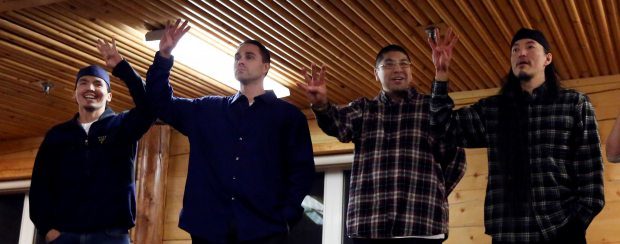Alaska Dispatch News: Anti-Native American Bias Was Key to ‘Fairbanks Four’ Case
03.28.16 By Innocence Staff
Over the course of the past several years, the “Innocence Blog” has covered the case of four Native American men—George Frese, Eugene Vent, Marvin Roberts and Kevin Pease, also known as the Fairbanks Four—who were convicted of the 1997 murder of teenager John Hartman and spent 18 years in prison for a crime that their lawyers at the Alaska Innocence Project say they didn’t commit. Late last year, the men were freed after the court reversed their convictions based on new evidence pointing to their innocence, but a recent op-ed by Charles Wohlforth, columnist for the Alaska Dispatch News, says that the men should have never been convicted in the first place and that it was anti-Native American bias in Alaska that contributed to their wrongful convictions.
According to Wohlforth, the men had solid alibis for the time of the crime, but when it came to alibi witnesses testifying at the Fairbanks Four trials, the individuals were largely dismissed; they were Native American speaking on the behalf of other Native Americans, so it was assumed that they were lying to protect “their own.” Wohlforth writes about one of Marvin Roberts’ key alibi witnesses:
Eileen Whitmer knew Marvin Roberts wasn’t guilty of murder in 1997, because when the Fairbanks Four were supposedly on a rampage killing teenager John Hartman, Roberts was sitting at a table with her at a wedding reception. . . .
. . . “My testimony was fairly short, and they asked direct questions,” she said of the trial. “But after the fact, it was — all these witnesses are just community people rallying behind these Native kids. And I said, what? That doesn’t make any sense. I didn’t know any of these kids. I hardly knew Marvin.”
“What was unbelievable to me was that the jurors didn’t believe what we had to say,” Whitmer told me Friday. . . .
. . . If Whitmer had been a white woman at a wedding reception with other white guests and had given her statement, I don’t think we would ever have heard of the Fairbanks Four. The true killers might have been caught.
The facts of the Fairbanks Four case are exceptional. Unfortunately, the cultural and racial divide it represents is not. Alaska’s prisons hold twice as many Natives as would be expected by their population. There are many reasons for that disparity . . . [b]ut I think one reason is unconscious racial bias. . . .
. . . “The police never contacted me, it was an investigator for the defense attorney,” Whitmer told me Friday. “I actually contacted the police early on. But they disregarded me and they didn’t even have a record that I called.”
Whitmer’s time on the witness stand was brief. But prosecutors attacked all the alibi witnesses as a group, citing inconsistencies and suggesting they were lying because they were Natives sticking up for other Natives. . . .
. . . [J]urors seem to have bought the theory. When O’Donoghue’s [journalism professor at the University of Alaska Fairbanks] students interviewed two non-Native jurors who voted to find Roberts guilty, they said all the defense witnesses were unbelievable, but the single witness supporting the prosecution’s theory about a rampage was “courageous” for going against the other Natives. . . .
. . . This case shows how bias can affect Natives in the justice system, which could lead in various ways to more Natives being in prison. Without realizing it, members of the dominant culture can easily place negative categories on minority groups, and act accordingly. The Fairbanks Four case is just one vivid example.

Leave a Reply
Thank you for visiting us. You can learn more about how we consider cases here. Please avoid sharing any personal information in the comments below and join us in making this a hate-speech free and safe space for everyone.